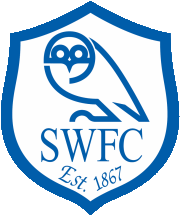
SHEFFIELD
WEDNESDAY F.C.
Founded: 1867
Also Known As:
THE WEDNESDAY (1867-1929)
SHEFFIELD WEDNESDAY (1929-)
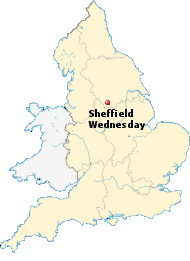
CLICK ON THE MAP TO
VIEW ENLARGED MAP
|
SHEFFIELD WEDNESDAY F.C. (Football Club)
Known as 'The Wednesday FC' until the 1929-30 Season
Included Info: Brief History, Club/Stadium Info, Team Jersey & Much More...
BRIEF HISTORY of SHEFFIELD WEDNESDAY FOOTBALL CLUB
(reproduced from 'Wikipedia' pages)
The club was a cricket club when it formed in 1820 as The Wednesday Cricket Club headed by Gerald Hamilton of
Leigh, Lancashire (named after the day of the week when they played their matches). A meeting on the evening of
Wednesday 4 September 1867 at the Adelphi Hotel established a footballing side to keep the team together and fit
during the winter months. On 1 February 1868, Wednesday played their first competitive football match as they
entered the Cromwell Cup, a four-team competition for newly formed clubs. They went on to win the cup, beating
the Garrick Club 1–0 after extra time in the final at Bramall Lane. The move to professionalism took the club
from Bramall Lane, which had taken a share of the ticket revenue, to the new Olive Grove. In 1889 the club became
founder members of the Football Alliance, of which they were the first champions in a season where they also
reached the 1890 FA Cup Final, losing 6–1 to Blackburn Rovers at Kennington Oval, London. Despite finishing the
following season bottom of the Alliance, they were eventually elected to the expanded Football League in 1892.
They won the FA Cup for the first time in 1896, beating Wolverhampton Wanderers 2–1 at Crystal Palace. In a strong
decade Wednesday won the League twice in the 1902–03 and 1903–04 seasons and the FA Cup again in 1907, beating
Everton 2–1, again at Crystal Palace. After this the club went through a relatively fallow period for another
two decades. The club was almost relegated in the 1927–28 season, but with 17 points in the last 10 matches they
pulled off a great escape, rising from bottom to 14th. Wednesday went on to win the League title the following
season (1928–29), which started a run that saw the team finishing lower than third only once until 1936. The
period was topped off with the team winning the FA Cup for the third time in the club's history in 1935.
The 1950s saw Wednesday unable to consistently hold on to a position in the top flight and this period became
known as the yo-yo years. After being promoted back up in 1950, they were relegated three times, although each
time they bounced back up by winning the Second Division the following season. The decade ended on a high note
with the team finally finishing in the top half of the First Division for the first time since the Second World
War. This led to a decade of successfully remaining in the First Division, which included a run to the FA Cup
Final in 1966. Wednesday were relegated at the end of the 1969–70 season, starting the darkest period in the club's
history. After going into free-fall they dropped to the Third Division for the first time in their history and were
marooned there for five seasons. The club was almost relegated to the Fourth Division in 1976, but a revival under
the management of Jack Charlton, and the aid of coach Tony Toms, and after Charlton resigned in 1983, Howard
Wilkinson, saw them return to the First Division in 1984. Sheffield Wednesday spent the majority of the 1980s
and 1990s in the top tier of English football. On 15 April 1989, the club's stadium was the scene of one of the
worst sporting tragedies ever, at the FA Cup semi-final between Liverpool and Nottingham Forest, at which 96
Liverpool fans were fatally crushed in the Leppings Lane end of the stadium. The tragedy resulted in many changes
taking places at Hillsborough and all other leading stadiums in England, namely the requirement of all-seater
stadiums and the removal of perimeter fencing.
The 1990–91 season was the only one out of sixteen in a row that Wednesday spent in a lower division, but the
season is best remembered by fans for Wednesday's swift return to the top flight under the management of Ron
Atkinson and their League Cup victory over Manchester United to win their first major trophy for over 50 years.
This League Cup triumph was the last domestic cup to be won by a club competing outside the top level of English
football. The following season Wednesday finished third in the league. The 1992–93 season established Sheffield
Wednesday as a top club as they visited Wembley four times during the season – a League Cup final and an FA Cup
semi-final, final and replay. In the FA Cup semi-finals they recorded an historic win over the city rivals
Sheffield United, 2–1. However Wednesday failed to win any silverware, losing to Arsenal in both League and FA
Cup finals. Wednesday's fortunes took a turn for the worse when a succession of managers failed to maintain this
form. A failure to beat Brighton & Hove Albion in the penultimate game of the 2002–03 season condemned them to
another relegation. The 2007–08 season began with Wednesday's worst ever start to a season, losing six league
games in a row. Chairman Dave Allen resigned in November 2007, and Wednesday avoided relegation with a win on
the last day of the season. The Owls improved in 2008–09 and finished in 12th place, with the best home defensive
record in the division. Halfway through Sheffield Wednesday's 2009–10 season Brian Laws was sacked, and was
replaced by Alan Irvine. On the last day of the season, needing a win to stay up, Wednesday drew 2–2 with Crystal
Palace and were relegated to League One.
|
CLUB FACTS & INFORMATION
| Official Name
| --
| Sheffield Wednesday F.C. |
| Club Nickname
| --
| The Owls |
| Year Founded
| --
| 1867 (150 years ago) |
| English County
| --
| South Yorkshire |
| Current Ground
| --
| Hillsborough |
| Ground Location
| --
| Sheffield, England |
| Club's Owner
| --
| Dejphon Chansiri |
| Club Chairman
| --
| Dejphon Chansiri |
| Current Manager
| --
| Carlos Carvalhal |
| Current League
| --
| Championship |
| Last Season
| --
| Championship, 4th place |
HOME COLORS

Blue, White & Black |
AWAY COLORS

Black & Aqua Blue |
|
| |
INTERESTING STADIUM FACTS & INFORMATION

HILLSBOROUGH STADIUM
Sheffield, South Y6orkshire, S6-1SW, England
OPENED: ......... September 2, 1899
SURFACE: ........ Desso GrassMaster
COST: .............. not available
CAPACITY: ...... 39,732
RECORD: ......... 72,841 (1934 vs Manchester City)
OWNER: ........... Sheffield Wednesday F.C. Ltd
OPERATOR: ..... Sheffield Wednesday F.C.
FIELD SIZE: ..... 116 x 71 yards (106 x 65 meters)
|
|
|
HOME JERSEY
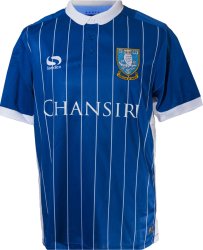 |
AWAY JERSEY
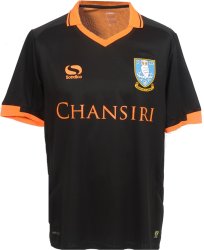 |
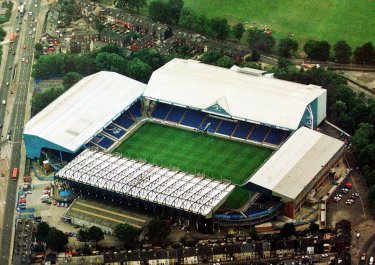
Click On Aerial Photo To View/Download Enlarged Image
|
Hillsborough Stadium (Sheffield Wednesday) Seating Diagram
Click On Diagram Below To Enlarge View
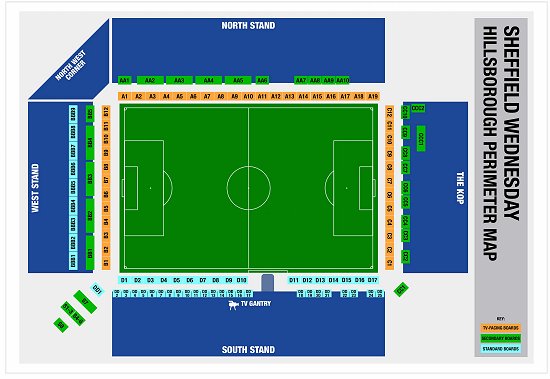
|



SHEFFIELD WEDNESDAY STADIUM WALLPAPERS (Free Download)
Wallpaper Size below is 800x600: To Download Bigger Sizes, Click On Any Button Shown Above
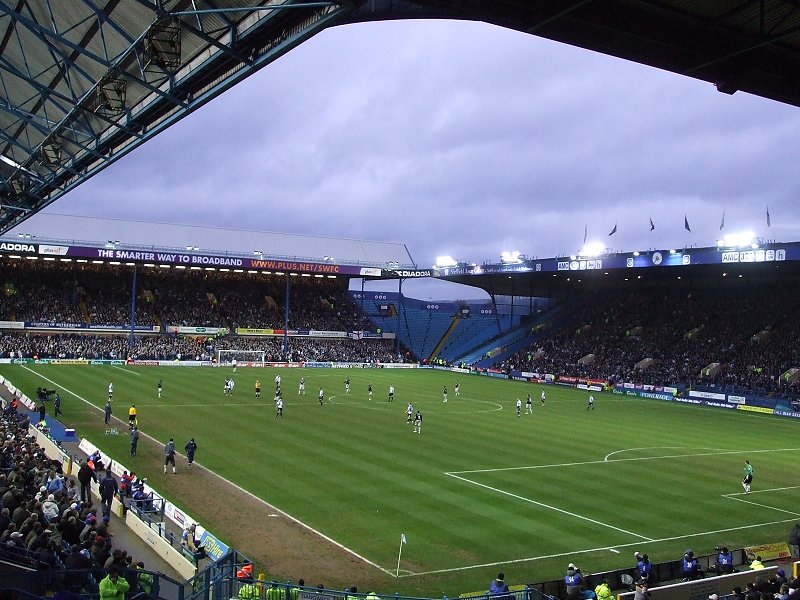
|
|

